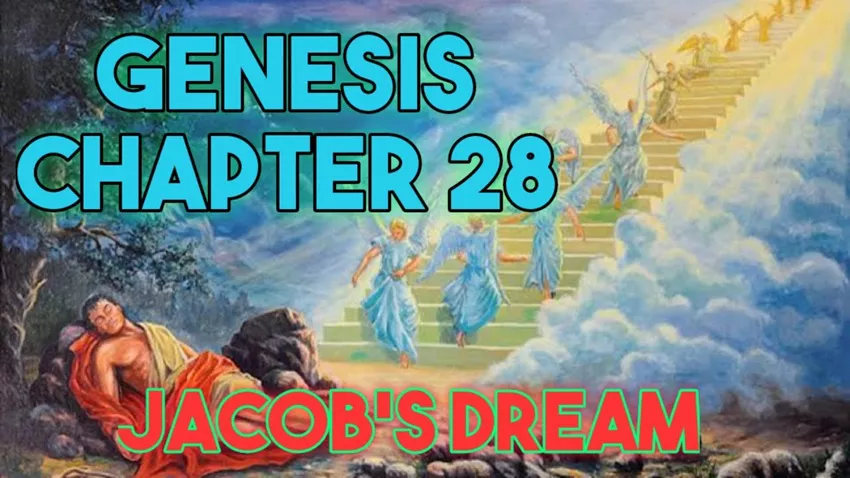Genesis Chapter 28 Summary
Genesis Chapter 28 details Jacob’s departure from Beersheba as he flees to Haran to escape Esau’s wrath after stealing his blessing. As Jacob journeys, he stops for the night and has a profound dream in which he sees a ladder reaching from earth to heaven, with angels ascending and descending upon it. God appears to Jacob, reaffirming the covenant made with Abraham and Isaac, promising him land, numerous descendants, and blessings that will extend to all families of the earth through him. When Jacob awakens, he acknowledges the sacredness of the place, naming it Bethel, meaning “House of God.” He vows to serve God and sets up a stone pillar as a memorial, pledging a tenth of all he receives in return for God’s protection and provision. This chapter illustrates Jacob’s transformation and the deepening of his relationship with God.
Bible Genesis Chapter 28
Welcome to read Genesis Chapter 28. Here is the list of Genesis Chapter 28:
What Does Genesis Chapter 28 Teach Us?
Genesis Chapter 28 is a pivotal section in the biblical narrative, highlighting themes of faith, divine promise, and the importance of spiritual encounters. This chapter recounts the story of Jacob, who, after receiving his father Isaac’s blessing, embarks on a journey to his uncle Laban’s house. Here, we will explore the key teachings from this chapter, focusing on the significance of God’s promises, the concept of sacred places, and the nature of personal encounters with God.
The Significance of God’s Promises
Jacob’s Blessing
Genesis 28 opens with Isaac blessing Jacob and instructing him not to marry a Canaanite woman. Instead, he is directed to seek a wife from the daughters of Laban, his mother’s brother. This blessing is crucial as it reinforces the Abrahamic covenant passed down through Isaac to Jacob. Isaac’s words are a reminder of God’s promises to Abraham, which include the inheritance of land and numerous descendants.
Application for Today: This highlights the importance of seeking divine guidance in major life decisions. Just as Jacob was directed to find a wife from within the family line of faith, believers today are encouraged to consider their spiritual values when making choices, particularly in relationships.
The Dream of the Ladder
As Jacob travels to Haran, he stops for the night at a place called Luz, using a stone for a pillow. Here, he has a profound dream of a ladder set up on the earth, with its top reaching to heaven. Angels are ascending and descending on it, and God stands above it, reiterating the promises made to Abraham and Isaac. God assures Jacob that He is with him, will protect him, and will bring him back to this land.
Theological Implications: This vision signifies the connection between heaven and earth, illustrating that God is actively involved in human affairs. The ladder represents Jesus Christ, the ultimate mediator between God and humanity, affirming that through Him, believers can access divine blessings and guidance.
The Importance of Sacred Places
Bethel: A Place of Encounter
After his dream, Jacob wakes up and declares, “Surely the Lord is in this place, and I did not know it!” (Genesis 28:16). He recognizes the significance of the location, which he names Bethel, meaning “House of God.” Jacob takes the stone he used as a pillow and sets it up as a pillar, anointing it with oil as a sign of dedication.
Spiritual Insight: This teaches that certain places can become sacred when God reveals Himself to individuals. The physical space becomes a marker of a spiritual encounter, reminding us that God can meet us in the ordinary moments of life. Bethel serves as a reminder that our encounters with God can occur anywhere, but some places can carry a deeper significance in our faith journey.
Commitment to God
Upon awakening, Jacob makes a vow to God, promising that if God continues to be with him and provides for him, then the Lord will be his God. He also commits to giving a tenth of all he has back to God. This act of dedication indicates a shift in Jacob’s understanding of his relationship with God; it transitions from being a passive recipient of blessings to an active participant in the covenant.
Personal Reflection: Jacob’s commitment invites believers to consider their own relationship with God. How do we respond to God’s promises in our lives? Are we willing to make a commitment to serve and honor Him with our resources and lives?
Conclusion
Genesis Chapter 28 teaches profound lessons about the nature of God’s promises, the significance of sacred spaces, and the call to personal commitment. Jacob’s encounter with God at Bethel serves as a transformative moment, shaping his identity and future.
For contemporary believers, this chapter encourages us to seek God’s guidance in our decisions, recognize the sacredness in our surroundings, and commit our lives to Him in faithfulness. Just as Jacob’s journey began with a divine promise, our spiritual journeys are marked by God’s faithfulness and the call to respond in trust and obedience. By embracing these teachings, we can cultivate a deeper relationship with God and live out our faith with intentionality.
Related topics:


